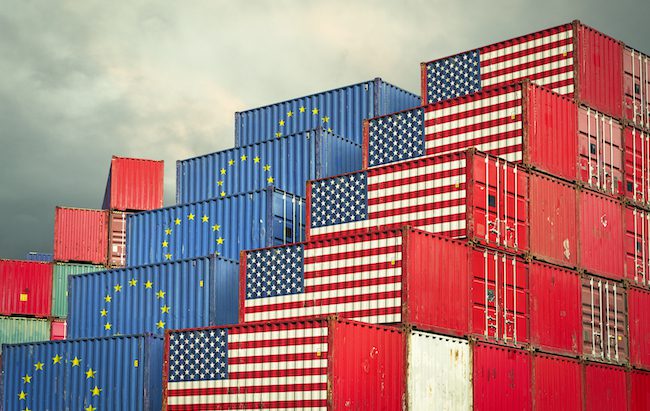Tariff on EU alcohol could axe 60,000 jobs
A new study has estimated that a 15% tariff on EU wine and spirits imports could cause a loss of nearly 60,000 jobs and raise prices for American-made products.

On 27 July 2025, European Commission president Ursula von der Leyen and US president Donald Trump announced a bilateral agreement on tariffs and trade. As part of its implementation, Trump established a 15% tariff ceiling on imports of EU products into the US.
Then, on 1 August, Trump implemented a widespread tariff policy that does not include any provisions on spirits categories, geographically protected or otherwise.
New data from John Dunham and Associates (JDA), provided to the Wine & Spirits Wholesalers of America (WSWA), looked at the economic impact of a 15% tariff on EU wine and spirits imports to the US.
It estimates a loss in wages of US$3.1 billion, a US economic output depletion of USS$9.7bn, and a loss of US$633 million in state and local tax revenue.
For spirits, JDA expects the 15% tariff to lead to a loss of approximately 19,000 jobs and US$979,000 in wages. The losses for wine are far larger at 40,515 jobs and US$2.12bn in wages.
Based on JDA’s analysis, the tariff is predicted to add a tax cost for spirits of US$555,898,589 and an increase of US$0.82 per gallon.
Addressing the impact on its members, WSWA’s executive vice-president of strategic communications and marketing, Michael Bilello, said: “Our members who import and distribute single-origin products are undoubtedly being impacted.
“The JDA analysis projects more than US$663 million in lost state and local tax revenue, over 59,000 lost jobs, and a US$1.6 billion total tax cost from a 15% tariff on EU beverage alcohol imports. These are not abstract numbers – they represent real businesses, real jobs, and real communities at risk.”
‘Inevitable’ cost hikes
Bilello also warned that the tariffs could cause a ripple effect across the US supply chain.
“The beverage alcohol industry is deeply interconnected. Even if a product is distilled or bottled in the United States, inputs like cork from Portugal or glass from EU nations mean tariffs still take a toll,” he added.
“The JDA study shows that a 15% tariff could drive wholesale prices up [by] an average of US$0.22 per gallon across all product categories [spirits, wine and beer] – costs that inevitably work their way to consumers.”
The WSWA warned that the tariffs could lead to a price hike for locally made products in the US, despite not being affected by tariffs, as companies face less competition.
“Tariffs create a price floor across the entire category, raising costs even for domestically produced products and making it harder to compete,” Bilello noted.
Like many other alcohol associations, the WSWA is calling for a return to tariff-free trade.
“We need to get back to zero-for-zero tariffs,” said Bilello. “While the impact will vary company by company – and in some cases, brand by brand – the reality is that these tariffs have already been passed along to consumers in some instances. If not now, then certainly in the future, as these taxes remain in place, consumers will pay the price.”
Related news
